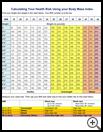
Weight Control During Pregnancy
________________________________________________________________________
KEY POINTS
- Your healthcare provider will suggest a range of weight that you should gain during your pregnancy.
- You will gain 20 pounds just by being pregnant. You should not try to lose weight during pregnancy because it could hurt the baby.
- Your provider can review your diet and make sure that you are eating the right kinds and amounts of food for you and your baby.
________________________________________________________________________
When you are pregnant, you need to get the right amount of calories from your food to nourish your baby and stay in good health yourself.
How much weight should I gain?
Your healthcare provider will suggest a range of weight that you should gain--usually about 20 to 35 pounds (lb), or 5 to 16 kilograms (kg), if you were a normal weight before you got pregnant.
You will gain 20 pounds just by being pregnant as your breasts, uterus, and baby get bigger. The placenta, bag of waters (amniotic sac), and extra blood and body fluids are included in this 20-pound gain.
The following table gives recommended ranges of total weight gain if you are pregnant with 1 baby. It is based on your BMI (body mass index) before pregnancy. The BMI uses your height and weight to estimate how much fat is on your body. It can be used to see if you are overweight. You can use a Web site to calculate your BMI, such as http://www.nhlbi.nih.gov/health/educational/lose_wt/BMI/bmicalc.htm.
-------------------------------------------------------- Weight Recommended Classification BMI Weight Gain* -------------------------------------------------------- Underweight under 18.5 28 to 40 lb (13 to 18 kg) Normal weight 18.5 to 24.9 25 to 35 lb (11 to 16 kg) Overweight 25 to 29.9 15 to 25 lb (7 to 11 kg) Obese 30 or higher 11 to 20 lb (5 to 9 kg) -------------------------------------------------------- * Women less than 18 years old should try to gain weight at the higher end of these ranges.
If you are pregnant with twins, the recommended weight gain is 37 to 54 lb (17 to 24 kg) if you have a normal weight, 31 to 50 lb (14 to 23 kg) if you are overweight, and 25 to 42 lb (11 to 19 kg) if you are obese.
If you are overweight, you may have a larger baby and you may be at higher risk for diabetes during pregnancy. However, you should not try to lose weight during pregnancy because it could hurt the baby. You should still gain at least 11 to 15 lb (5 to 7 kg) during pregnancy.
If you are underweight, you are more likely to have problems such as early delivery and bleeding. Your healthcare provider can help you plan a diet to help you gain weight.
What if I gain too much weight?
If you gain too much weight, you may be overeating or eating the wrong types of foods. Your provider can review your diet and make sure that you are eating the right kinds and amounts of food for you and your baby. If you gain too much weight while you are pregnant, it may be hard for you to lose the extra pounds after your baby is born.
If you are not overeating and are eating the right types of food, the extra weight is usually extra water. Extra water can be caused by too much salt in your diet. If you gain 3 to 5 pounds (1 to 2 kg) in 5 to 7 days, you should call your healthcare provider. This is important because this sudden weight gain may be a sign of preeclampsia (a condition that causes high blood pressure, extra water weight, and protein in the urine). Your provider will tell you how much salt and calories you should eat if you have this problem.
What if I don't gain enough weight?
If you have gained less than 2 lb (1 kg) a month in the last 6 months, it may mean that your baby is not growing. Babies who weigh less than 5 lb (2 kg) at birth may have problems, such as breathing problems or bleeding in the brain. It’s also important not to lose weight while you are pregnant. Ask your healthcare provider or dietitian to help you plan your diet if you are having trouble gaining weight.
Special situations
- If you are a teenage mother, you are still growing yourself and need extra nutrients. Talk to your healthcare provider about a diet plan.
- If you need financial help buying healthy foods, a government program called the Special Supplemental Food Program for Women, Infants, and Children can help you buy foods like milk, eggs, cheese, and bread.
- If you have cravings for things that are not food (such as starch, clay, or ice) and eat these things instead of food, you will not get good nutrition and it will be hard for you to gain weight. This is called pica. Talk to your healthcare provider if you have these cravings.

